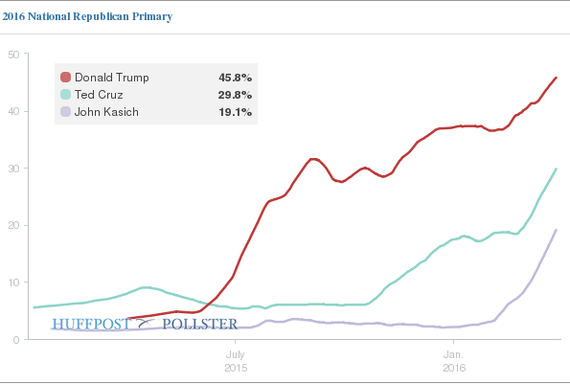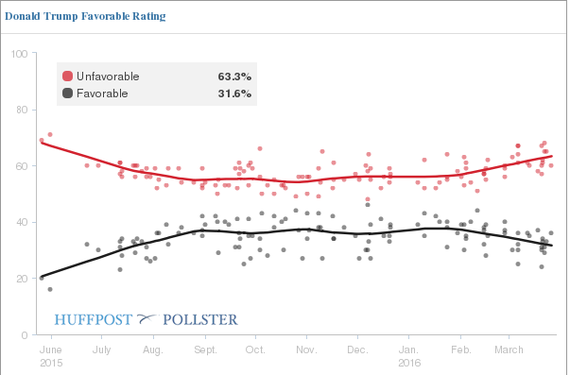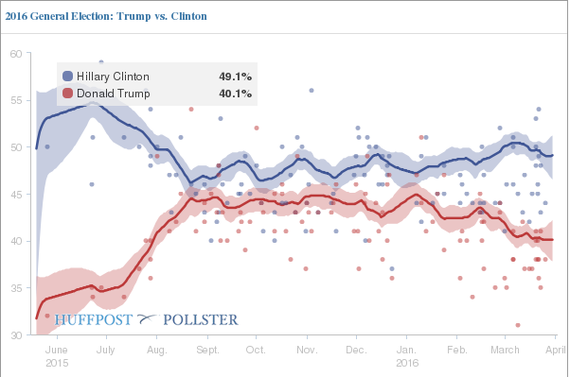The Teflon Don: One of the reasons many observers doubted the ability of Donald Trump to win the Republican nomination was the inevitable onslaught of negative advertising he would have to endure. Politically, Trump is an unlikely Republican nominee. In a party that routinely casts out RINO (Republicans in Name Only), he is not clearly or consistently conservative. And, while he can claim some success in the business world, the success has been built with the sort of sleight-of-hand is made Wall Street a popular target this campaign season. If that were not enough, his personal life provide an ill-fit to the political party that gave political relevance and meaning to the term "family values". One can only imagine the eager and salivating campaign consultants designing the negative political ads that would take down Donald Trump.
Reality, however, does not always conform to our expectations or analyses, and Trump has proven remarkably resilient against the negative attacks. By some estimates, Trump has endured $67 million in negative attacks since the beginning of the campaign. Despite the ads, Trumps lead in the national polls continues to grow. Like the villain in a horror movie, every time you imagine Donald Trump is wounded he emerges with surprising force in the next scene.
Perhaps this shouldn't have been so surprising. Political scientists have been studying negative advertisements for long time and have typically found the effects are almost always overhyped by the news media and political consultants. Negative ads might be effective within a particular context but they provide no magic bullet guaranteeing electoral success. There are several reasons why this would be the case for Donald Trump.
1. Not all political ads are created equally. Some are effective, some are not. The real question is how well the message of the ad resonates with voters. There are different mechanisms for measuring an ad's effectiveness, including pre/post market tests where ads are rolled in a specific market and tracking polls indicate effectiveness as well as online evaluations. Ace Metrix, which test effectiveness using a national samples of voters to evaluate individual ads, provided a recent analysis of the anti-Trump ads to date.
Not only is there variance in the effectiveness of each ad, but different groups of voters -- Independents and Republicans -- rate the ads very differently. This is why targeting advertisements to different sets of voters is so critical to campaign's overall success.
2. As has been widely documented, Trump's campaign has dwarfed all the other campaigns in free media time. According to The New York Times Upshot Blog, Trump has received $1.8 billion in free media time -- more than all other Republican candidates combined.
This means not only has Trump been able to respond to the attacks, he has been able to do so for free and often by phone. As a result, Trump appears to have emerged mostly unscathed from a barrage of attack ads. But...
Not So Fast My Friend: But there is also reason to believe the ads have had some consequence even if the effects are mostly at the margins and difficult to attribute directly to the anti-Trump campaign. Despite his strong showing in the primaries, Trump's is not only widely disliked but his unfavorable numbers appear to be increasing.
He is also doing worse in the general election trial heats against Hillary Clinton, though the again the effects are mostly marginal. Philip Bump of the Washington Post, for example, recently concluded that Trump is "the worst, not best, general election candidate."
In addition, Trump is doing worse among two groups of voters necessary to win the general election -- women and independents -- and has relatively large percentages of Republicans indicating they would never vote for him.
• When asked "which of these candidates would you never vote for?" 17 percent of Republicans and 54 percent of Independents say they would never vote for Trump
• 47 percent of female Republican voters say they "cannot see supporting" Trump. By comparison, only 32 percent say would not support Cruz (32 percent) or Kasich (27 percent). His problems with women are even worse when you included Democrats and Independents.
Overall, negative ads are not a magic bullet. They can be effective but their effect depends critically on context, message, and target audience. The negative ads employed against Trump in this nominating cycle may have come too late redefine his bid for the Republican nomination. His recent missteps on abortion will likely cost him far more. They may, however, have helped chipped away at his favorable rating, hurt him among key demographic groups, and adversely affected his chance in November. Even here, they are only one of many factors influencing public opinion and it is difficult to establish a clear causal relationship between his declining support and $67 million in negative ads.


